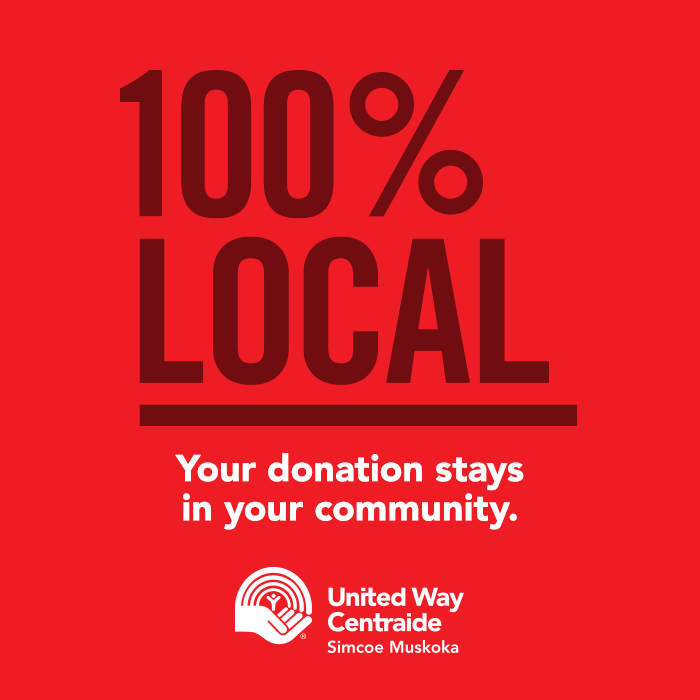
21 Dec UWSM funds steps to success
When we talk about poverty, it isn’t a simple conversation about a single issue. It goes beyond income. It’s about inadequate education, health, financial, physical and social resources needed to sustain positive well-being. In Simcoe Muskoka, United Way thinks local poverty is unignorable.
UWSM’s Community Impact Grants invest in community-based programs across Simcoe Muskoka that provide pathways out of poverty. In North Simcoe, one of our Partner Agencies is helping local residents increase their literacy skills and open the door to better employment and education.
By Gateway Centre for Learning
Gateway Centre for Learning is a non-profit, charitable adult literacy organization located in Midland, Ontario, North Simcoe County. We offer free confidential tutoring and small group classes to adults in reading, writing, math, computer, employability and life skills. We increase awareness of literacy needs and promote a literate society. We depend heavily on donations, funds raised through various initiatives, including our Bookmark Used Books store, and our many volunteers.
Our grant from United Way Simcoe Muskoka supports our Steps to Success program – a 12-week program providing reading, writing, math & computer upgrading to help transitional-aged youth move from poverty to possibility.
What is literacy?
Literacy is measured via a 5-level system.
Levels 1 and 2 are considered to be “low literacy”, below the minimum literacy skills (reading, writing or performing basic math) required for high school. Adults in Level 1 have serious difficulty dealing with even the most basic written materials. They may be unable to determine from a package label the correct amount of medicine to give a child, and may be unable to learn new job skills.
- 42% of Ontarians aged 15 and over fall into Levels 1 and 2. This means that they do not have the literacy skills to cope with everyday life and work. Only about 57% of adults at these levels are employed. Household income for those with Level 1 or below is 33% lower than for those with Level 2, and 70% lower than for those with Level 4 or 5.
- 21.3% of working age Ontarians struggle with serious numeracy challenges and have difficulty with even the most basic math.
- Despite the need, less than 5% of Ontarians at Level 1 and 2 participate in adult literacy programs.
- Depending on the province, only 5% to 30% of youth with Level 1 and 2 literacy skills go on to some form of post-secondary study. These students get lower marks and are much more likely to drop out before graduation.
Level 3 is the level that students need to take full advantage of study at the post-secondary level. It is also the proficiency level demanded by the overwhelming majority of jobs in the Canadian economy.
Level 4/5 are the highest levels of literacy skills. In 2004 only 14% of Canadian adults score at these levels – a significant decrease from a decade previously.
What are the barriers to literacy?
Low literacy stems from different, generally inter-related causes which, together, create a series of often insurmountable barriers. Low literacy is often passed on from parents to children, in a process known as intergenerational transmission.
For instance, for someone born into an underprivileged milieu to parents with little formal schooling, the likelihood of having low literacy or experiencing serious learning difficulties will be higher. Children from low literacy/low income households often do poorly in school, leave early, and end up in low paying jobs, thus continuing the cycle of poverty. Literacy intervention is a key support for Canadian families moving out of poverty.
The following are the most frequent causes of low literacy in adults:
- Parents with little schooling;
- Lack of books at home and lack of stimulation as to the importance of reading;
- Doing badly at or dropping out of school—many have not completed high school;
- Difficult living conditions, including poverty;
- Learning disabilities, such as dyslexia, dysorthographia, etc.
Low literacy and employment
Adults aged 45 and over with low literacy skills have the distinction of belonging to generations for whom there were attractive job opportunities despite a lower level of schooling. A very large number of them have always worked in the same field, and thus have never felt the need to go back to school.
Owing to the closing of many companies over the past few years, especially in the manufacturing and primary sectors, these people have found themselves out of work, and are often unable to find a new job, because they have difficulty reading and writing. Also, they lack the necessary skills to meet current market requirements or to register in training that would allow them to requalify.
What the learners say…
“The customer service course I took through you guys really helped me a lot. In fact, all of the certificates I received impressed the employer. I was well prepared for the two interviews. I am so happy. I have a beautiful apartment and many friends. I celebrated 12 years’ sobriety here and still go to three meetings a week. I also adopted a cat. Please keep in touch. You guys helped me out so much that I want to give back – I might want to make a donation of some sort.”
“When you walk in the door you know everyone is there to help us. When you first come your self-esteem is not good but in the end you do have self-esteem.”
“As you are aware, I have been attending Gateway Centre for Learning for several months now. In that time, I have received fantastic, friendly assistance from your staff. They have assisted me with fine-tuning my resume, proper cover letters, job search and continued learning in others. I can even help my children more often and more comfortably now. All of us are happier.”
“I can’t tell you how much it meant to me to go to Gateway. I was depressed when I came in. I walked out feeling like I had been to therapy.”
Where else do UWSM donations go?
Local giving. Local results.
#LocalLove




Sorry, the comment form is closed at this time.